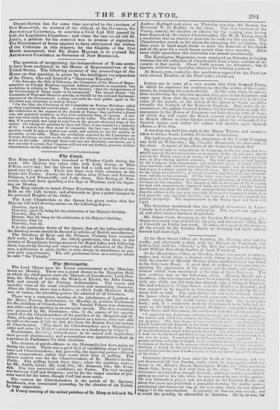The question of recognizing the independence of Texas seems to
have been cushioned in the House of Representatives of the United States. The following account of the proceedings of the House on that question, is given by the intelligent coriespondent of the Times, who call himself a " Genevese Traveller."
"On Saturday the 18th of February, the Committee of the House of Repre- sentatives on Foreign Relations reported, without preamble or argument, two resolutions in relation to Texas. The first declares, that the independence of the Government of Texas ought to be recognized.' The second directs ' the Committee of Ways and Means to provide, in the bill for the civil and diplomatic expenses of the Government, a salary and outfit for such public agent as the President may determine to send to 'Texas.'
"On the 21st, the Chairman of the Committee on Foreign Relations called up these regulations for consideration. A motion was made to pmtpone them, but withdrawn at the request of the friends of Texas; they pref. rred a direct vote, and appeared confident, as they have uniformly been, of success. A mo. tion was then made to lay the resolutions on the table. The effect of this mo- tion, if it prevailed, was equal to rejection in the present advanced stage of the session. On taking the question by Ayes and Noes, it was carried by a majority of 12. A motion was then made to reconsider the last vote ; hut before the question could be put, a motion was made, and carried, to lay the motion to reconsider on the table. Thus, the resolutions reported by the Committee on Foreign Relations are laid on the table, and the motion to reconsider that vote is also on the table. Although these votes are not absolutely conclusive, yet I now consider it certain that Congress will not act any further, previous to their adjournment, on the subject of Texas."


























 Previous page
Previous page